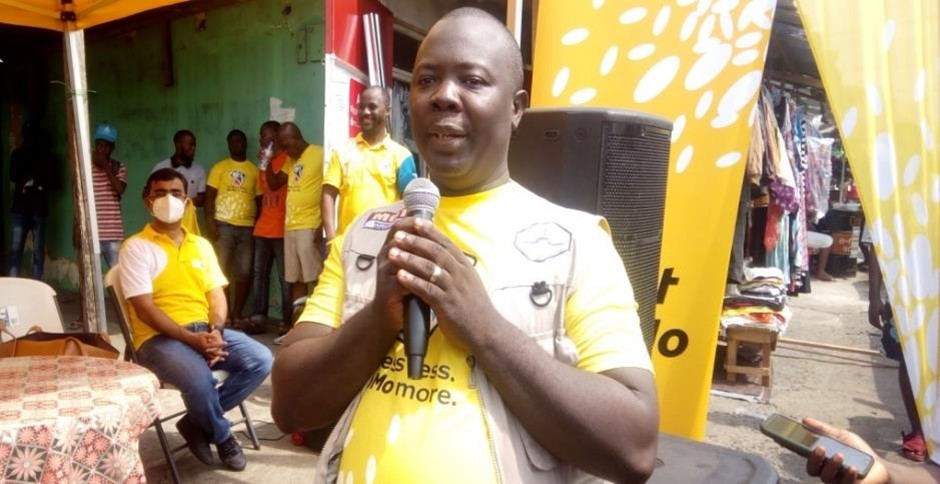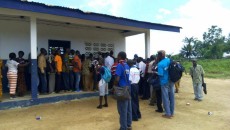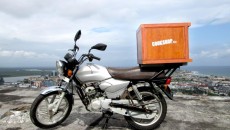MONROVIA, Montserrado – In an attempt to increase the number of financial transactions conducted by mobile money, Lonestar Cell MTN has launched a program to allow drivers in the transport sector to collect fares from passengers without fees using the digital platform.
On March 3, the telecommunications company launched Hopscotch, which is meant to target taxi, tricycle, and motorcycle drivers. MTN’s general manager for Mobile Money, Christopher Ssali, said the initiative would reduce the need for drivers to carry large amounts of cash. It would also be a more convenient way to allow customers to pay their fares without worrying about having the exact change, he added.
Ssali said the use of mobile money in the transport sector would put Liberia on par with other nations that are moving most financial transactions to the digital space. Liberia (and West Africa in general) has been slow to adopt mobile money, compared with East African countries.
However, over the past several years, Liberia has seen a steady rise in mobile money use. At the end of 2016, just over one million mobile money accounts had been created. By the end of 2019, that number had jumped to 3.3 million accounts. The value of transactions has also been increasing, from US$1.7 million and L$320 million in 2016 (approximately US$5.26 million) to US$539 million and L$49 billion in 2019 (approximately US$804 million). The increase in the value of transactions has been more than 15,000 percent.
Despite the increase in mobile money use, the Central Bank’s 2019 annual report suggested that most people were using the platform as a means of transfer and withdrawal of cash, rather than payments for financial transactions.
Ssali, the MTN general manager, said the company had lowered barriers to drivers using mobile money by eliminating transaction fees.
“No extra fees will be charged for withdrawal from Hopscotch Mobile Money account at any merchant or agents point in your areas,” he said.

MTN’s general manager for Mobile Money, Christopher Ssali. Photo: George K. Momo
He expressed regret that mobile money was used in few financial transactions in Liberia but said it was time to extend the service to everyone. Passengers can dial *156*3# plus the vehicle number, the fare, and # to pay their drivers, Ssali added.
At the launch, MTN presented 300 pieces of feature phones with SIM cards to tricycle and motorcycle operators. MTN put the value of each phone at US$10.
MTN collaborated with the Ministry of Transport to launch the service. The director for Tricycle and Motorcycle Union there, Lorenzo G. Beyan, said it was time to digitize financial transactions in Liberia.
“The Ministry of Transport is in full compliance and is knowledgeable with the Hopscotch Mobile Money,” he added. “I am a part of it, and I am encouraging all of us to go this way. I am appealing to all my tricycle, motorcycle riders, and my taxi drivers to make sure we are free and stressless when doing financial transactions.”
Beyan said he would like to see the service extended to all 15 counties, including in rural areas.

Ministry of Transport’s director of Tricycle and Motorcycle Union, Lorenzo G. Beyan. Photo: George K. Momo
For now, operators of commercial vehicles appear to welcome the new initiative from MTN. Fred N. Sarway, who purchased a tricycle in June 2020, told The Bush Chicken that he owns two other tricycles that report daily to him via mobile money anyway. Increasing payments from customers via mobile money will make the daily transfers much easier to do.
Sarway says he earns L$6,000 (US$34.68) daily driving his tricycle, while the operators of his two other tricycles report L$4,000 (US$23.12) to him on a daily basis.

Fred N. Sarway, operator and owner of tricycles. Photo: George K. Momo
Representatives of various unions from the transport sector were present at the launch, including the head of one of the tricycle unions and the taxi drivers’ union.
Feature photo by George Momo



